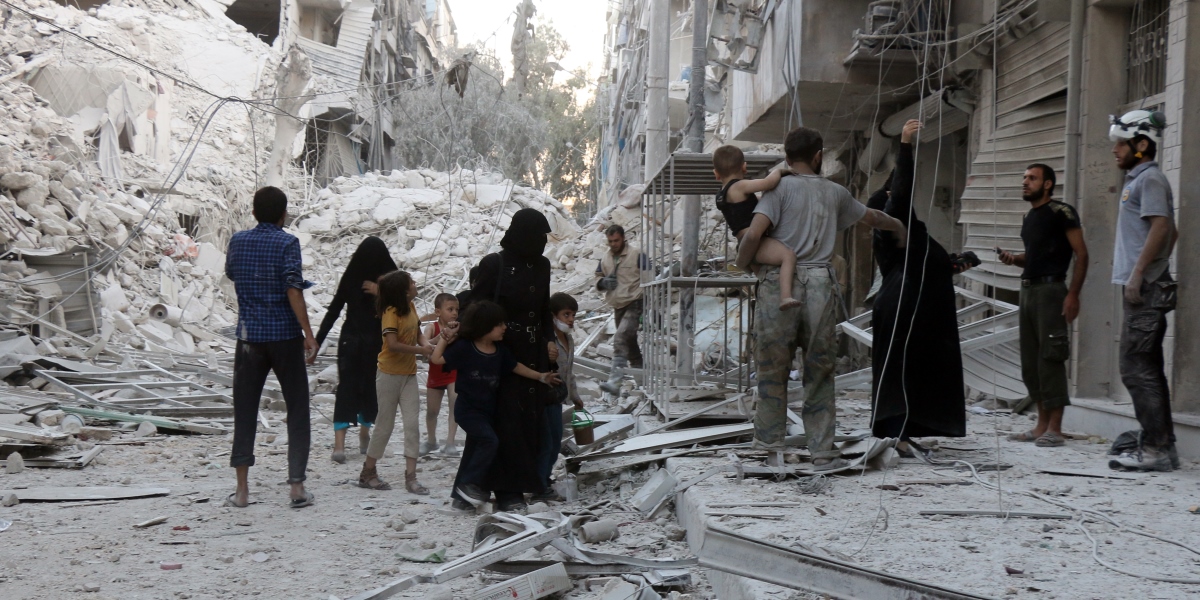If there is something as grievous as what is happening in Aleppo, it is the apathetic stance the world has taken up toward Aleppo. The new wave of attacks begun by the Assad regime on Aleppo on Sept. 22 has caused the deaths of more than 500 people, more than half of whom were women and children. More than 1,000 people were seriously wounded. It is estimated that in the airstrikes carried out, there were nearly 2,000 napalm and clusters bombs used.
The Syrian civil war, which has caused the deaths of 450,000 people, 50,000 of whom were children, is about to finish its sixth year. We can say that in the current state of affairs, there is a total deadlock, where the lack of a resolution has come to be the norm. This situation has brought with it an international inurement to the Syria crisis. In which way the geopolitical jam will evolve depends in large part on the U.S.'s and Russia's policies. The U.S. did not regard Syria as a worthy place over which to fight Russia. Russia, for its part, after testing the U.S.'s nerve in Ukraine is enjoying the space it has found once it saw what the U.S. was willing to do in Syria.
Turkey, Iran, and Saudi Arabia are showing a micro presence in Syria focusing mostly on attempting to eliminate the security threats against themselves. In contrast to all of the other actors in the field, Turkey alone has focused on the humanitarian tragedy going on in Syria, and whether through its open-door policy or its humanitarian aid program, it has attempted to rehabilitate the true victims of the Syria crisis as much as it could.
Unfortunately, the Syria crisis, precisely due to the deadlock I previously mentioned, has caused desensitization on a global level. The civilian deaths, the murdered children, the war crimes, the chemical weapons used and many other shameful acts have come to be ignored. In truth, Syria was left to the whims of destiny - or really, it was delivered into the bloody hands of the Assad regime. The greatest victim of this desensitization was Aleppo. Because in the past few days, the greatest of the devastations we have seen so far in Syria occurred in Aleppo.
The world we live in takes on a more dangerous aspect day by day. Still, we love our world and are connected to it with great affection. Nothing can ruin our happiness, our comfort. We are constantly striving to consume and keep on consuming.
The modernist literature of the 20th century was one shaped through the mass destruction created by the Western world. It focused on how the dreams of the age of enlightenment foundered. The depressive spiritual state caused by the great wars, economic crises, and humanitarian dramas gave itself away in the written texts. After the second half of the 20th century, that depressive state slowly began to abate. When we came to the 2000s, the happy literature of the age of globalization greeted us.
But in fact, the world we live in is getting more and more dangerous. One of the most important dynamics shaping the modernity of the 21st century is the continuation of threats and the asymmetry of experienced conflicts. Unfortunately, terrorism has transformed into a conventional form of warfare. The Middle East region is aware of this danger. Today, we live in a much more dangerous world compared to the world of the 1930s. Despite this, our literature and popular culture are much happier.
To me, the reason behind this psychological difference is that these devastations are not felt in the Western world. If the Western authors and writers of the global age do not possess the same level of "global consciousness" as the previous century, it is because the pains experienced have not reached the West's borders. I said "have not reached" but this should really be stated as "have not yet reached." Because world history shows us that these types of dangerous power plays first bring with them proxy wars, then wars without intermediaries, and eventually attempts of total occupation and invasion.
It might be helpful to make another correction. It is also possible that the pains that are experienced have reached Western shores, but it has not yet touched Westerners. In order to obstruct this feeling from touching them by way of the refugees who have reached Western countries, the immense effort spent for the ghettoization of these refugees could be seen as an attempt to escape from this pain. But this is not possible.
Neither the physics, the chemistry, nor the biology of this world will let that occur.
Perhaps, just perhaps, we might be able to find the "global conscience" we lost in Aleppo - we might find our humanity, and reverse this dangerous course of events.
[Daily Sabah, September 30, 2016]







